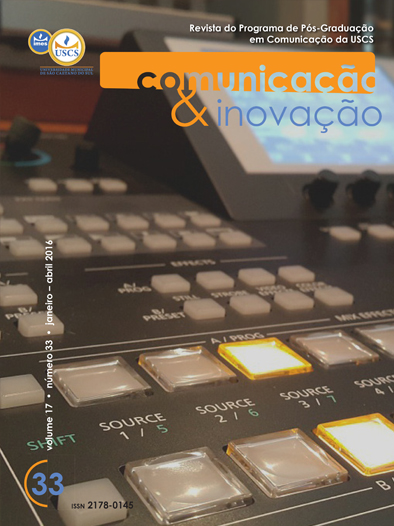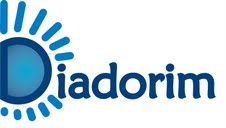New technologies in promotional televisual discourse
DOI:
https://doi.org/10.13037/ci.vol17n33.3521Keywords:
Televisual media. Promotional discourse. New technologies. Discursive production. Expantion and condensation.Abstract
These days, Brazilian television, besides its private character and thus the need to submit to the restrictions of the market, has been living with fast technological growth, which means completely rethinking their duties and even share its audience time with phones, tablets, computers. In this sense, the objective of this study is to investigate the relationship between this media and the new technological devices available, analyzing their effects on specificity of televisual discourse production, especially that of promotional nature. Therefore, discusses the properties of the television in the country, the influence of economic and technological factors in the discursive production and seeks to examine these traces in a station's program (television series Sete vidas).
Downloads
References
CASTRO, M. Promocional: um percurso convergente entre mundos, mídias e plataformas. In: DUARTE,
E.; CASTRO, M. Convergências midiáticas: produção ficcional – RBS TV. Porto Alegre: Sulina,
2010.
CASTRO, M. Tá no ar: a TV na TV e sua configuração estratégica. In: XXXVII CONGRESSO BRASILEIRO
DE CIÊNCIAS DA COMUNICAÇÃO – Intercom, Foz do Iguaçu, PR, 2014.
DUARTE, E.; CASTRO, M. Produção midiática: o ir e vir entre teoria, metodologia e análise. In:
BARICHELLO, E.; RUBLESCKI, A. (orgs.). Pesquisa em comunicação: olhares e abordagens.
Santa Maria: Facos-UFSM, 2014. p. 67-87.
DUARTE, E.; CASTRO, M.. Sobre a convergência midiática. In: ______. Convergências midiáticas: produção ficcional – RBS TV. Porto Alegre: Sulina, 2010.
ECO, U. Tevê: a transparência perdida. In: ______. Viagem na irrealidade cotidiana. Rio de Janeiro: Nova
Fronteira, 1984.
JENKINS, H. Cultura da convergência. São Paulo: Aleph, 2009.
JOST, F. Compreender a televisão. Porto Alegre: Sulina, 2010.
MACHADO, A. A televisão levada a sério. 3 ed. São Paulo: Senac, 2003.
MÉDOLA, A. Televisão digital, mídia expandida por linguagens em expansão. In: SQUIRRA, S.;
FECHINE, Y. (orgs.). Televisão digital: desafios para a comunicação. Porto Alegre: Sulina, 2009.
PATRIOTA, K. Sob demanda, convergente e interativa: a customização da publicidade na televisão digital.
In: SQUIRRA, S.; FECHINE, Y. (orgs.). Televisão digital: desafios para a comunicação. Porto
Alegre: Sulina, 2009.
PRIMO, A. Crítica da cultura da convergência: participação ou cooptação? In: DUARTE, E.; CASTRO, M.
Convergências midiáticas: produção ficcional – RBS TV. Porto Alegre: Sulina, 2010.
SEMPRINI, A. A marca pós-moderna: poder e fragilidade da marca na sociedade contemporânea. São
Paulo: Estação das Letras, 2006.
TÁ NO AR: A TV NA TV. Direção de núcleo: Maurício Farias. Um programa de Marcius Melhem,
Marcelo Adnet e Mauricio Farias. Rio de Janeiro: Globo Comunicação e Participações S.A., 2014.
Programa de televisão.
WOLTON, D. Elogio do grande público: uma teoria crítica da televisão. São Paulo: Ática, 2006.
Downloads
Published
How to Cite
Issue
Section
License
Copyright (c) 2016 Maria Lilia Dias de Castro

This work is licensed under a Creative Commons Attribution-NonCommercial-NoDerivatives 4.0 International License.
Conforme consta nas normas da revista, o envio de artigos e textos solicitando a apreciação com a finalidade de publicação na Comunicação & Inovação, configura a cessão de direitos autorais.
No caso de fotos e imagens, o autor deve providenciar documento que ateste a permissão em termos de direitos autorais.





